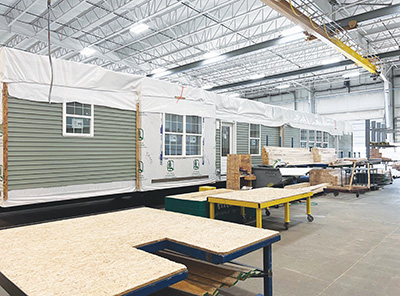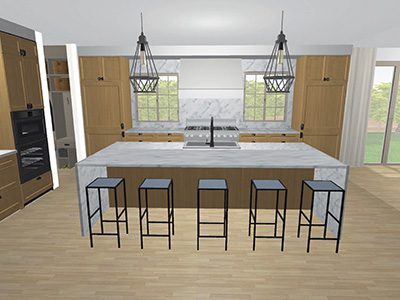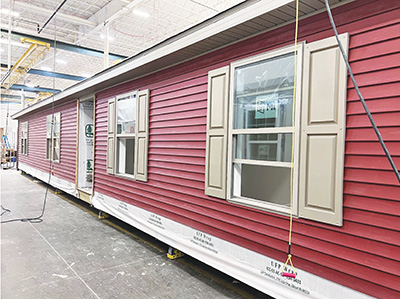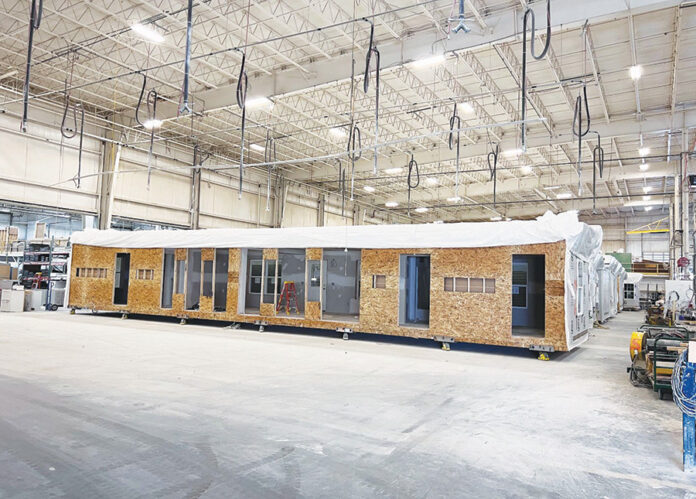This builder decided that a franchise would be the best choice. Here’s what they learned.
- They can build spec homes, but are really interested in the custom home market. They are working with architects, and have the ability to modularize existing plans.
- Although their tours of factories and house sets have convinced them of modular’s quality, educating their market on that remains one of their biggest challenges.
Larry Brodar and Steve Bradley were having successful careers in the commercial construction world. Bradley was a Senior Manager for Rand Construction Corporation and Brodar a Field Operations Manager for a $550 million company. Between them they had 45 years of experience.
But in 2021, they decided to go all in on a modular, residential construction company. Why did they make the leap and what have they learned in the process?

The Modular Solution
Bradley and Brodar thought about the future of the construction industry as they made their decision. They were keenly aware of the housing affordability issue and the length of time it took to build new homes. They knew that there was a lot of attention being paid to energy efficiency in homebuilding. And they saw that, each year, it was more difficult to find skilled labor.
They came to the conclusion that the solution to these challenges was modular homebuilding. “The time was right. The more we learned about modular, the more we felt it was the future of construction,” Bradley says.
Labor, in particular, was a major factor in their decision, Brodar says. “Every GC in our market was pulling from the same labor pool. We don’t have to worry about [factory workers] getting pulled down the road to another place.” The pair realized that the predictability offered by the factory would make it easier to deliver projects.
As they researched options for modular, they knew their previous experience would be beneficial. “In the commercial world,” Bradley says, “everything is driven by the schedule and the completion date. You schedule things well in advance and keep everyone on task to keep the project moving.” Modular makes it easier to do that.
The modular process can also save money for clients, adds Brodar. “With modular we can do groundwork and foundation at the same time we’re building the house in the factory. Time is money, and we don’t want to charge clients more for things they don’t need.”

The Franchise Choice
The question was how to get started. Because Brodar and Bradley were new to modular, they decided that the best approach would be to pursue a franchise rather than creating an independent business. So, in 2021 they approached Impresa Modular, a nationwide modular franchisor that has relationships with a network of factories across the US. A year later they signed a contract to become franchise owners. Their new company, DC Metro Custom Builder, was born.
“Steve and I had never started a business from scratch and [we saw a lot of value in] having a business infrastructure already in place,” explains Brodar. “The franchisor has a website and unbelievable SEO. It has leads. It brought us into the market in a fully baked way. Essentially, it was like buying a business in a box.”
They also say that being a franchisee with backing from a larger entity helps them schedule time in the factory. “You will get heard in the factory more easily than if you come in as an independent,” Brodar says.
He adds that franchisor-offered training was also a selling point. “The learning curve for modular construction is a deterrent for most people. The language is different, the way things are constructed is different. But with a franchise, the learning curve can be flattened out because we have the franchisor’s expertise and connections.”
The pair transferred money from their 401Ks and got a $360,000 Small Business Association (SBA) loan for working capital and business startup costs, including the franchise fees. They had a business plan (required to obtain the SBA loan) that was developed with some input from Impresa.
One of the first things they had to do was choose a territory. They chose Loudoun County (Va.) and Montgomery County (Md.) with rights to Fairfax County (Va.) and Frederick County (Md.). “Impresa has a strong desire for a franchisee to cover these territories because it provides continuity throughout West Virginia, Northern Virginia and Maryland,” Bradley says. “Due to growing demand for modular solutions, Impresa temporarily granted us operation throughout all of Maryland which we are continuing to service.”
The pair plan to build what Brodar calls “customizable” modular homes. Decks and porches will be built on-site. Says Bradley, “we’re open to doing any version of modular.”
Most of the home designs are supplied by Impresa, but they also have partnered with design consultant Elena Glas Home to help clients with floor plans. In addition, they’ve connected with architects to work with them in the future to help create designs for fully custom houses.
“We also have the capability of taking an existing home design and ‘modularizing’ it without sacrificing the aesthetics or functionality desired by the client,” Bradley says. Modularizing is the process by which a design is tweaked to meet the specs required by the modular factory, and the transportation and setting processes. This ability lets them work with clients who come to them with a design already in hand.
Homes will be built in an independent Pennsylvania factory, about 100 miles from their sites. Impresa provided them with access to shared CRM software (Keap), project management software (Buildertrend) and online training resources through Trainual. They can use all company marketing tools and logos to help promote their own individual brand in their markets. They can also attend factory tours and house sets to see firsthand the methods used by offsite construction.
As of August 2023, they were in the process of finalizing the design on a spec home and have three clients under contract for homes to be built by the end of the year. Costs for the homes are roughly $130 to $140 a sq. ft. but, of course, those numbers can change depending on the finishes.
They calculate site work separately because requirements can vary substantially. “The costs for a crane and the set are typically between $20,000 and $30,000 depending on home size,” Bradley says. They estimate they will sell to homebuyers for about $250 to $300 a sq. ft. for most turnkey projects.
Transporting the home is included in the quote Bradley and Brodar receive from the factory. “It’s based on the number of carriers you need and the number of miles you need to go, as well as state permit fees and fuel surcharges,” Bradley says.
Once the four projects are completed, Bradley says, “we’re looking at about $2.25 million in revenue. Our hoped-for profit number is around $500,000 or 22%.” He believes that might be a little lower than what they understand the residential market to be, but says, “we’re willing to make a little less profit while we get things rolling.”
They’ve established a marketing budget of about $25,000. “It’s a little high because we created our own website in addition to the Impresa site (dcmetrocustombuilder.com) and set up some initial social media platforms,” Bradley says. “We figure our marketing will still be about $1,200 a month, and we’ll probably spend $2,500 per year on one-off marketing like home shows or other events.”

Surprises and Challenges
Although they’ve been in the construction industry for a long time, they are still finding surprises. Some are pleasant. Says Brodar, “I never knew how energy efficient modular homes were or how well-built a structure they were. Now I know that you can get down to a zero HERS score because they’re so tight and energy efficient.” (HERS is the Home Energy Rating System, the industry standard measuring energy efficiency.)
He also didn’t realize how strong the homes must be to travel down the road and he has learned a lot about the amount of waste on a traditional building site, with estimates that range from 15% to 20% versus 3% for a factory-built home. “When your builder has a drywall delivery and there’s an extra 15 sheets left over, they throw it in the dumpster,” Brodar says. “Somewhere between 20% and 25% of the money [a homebuyer] has spent to build their house goes into a landfill. That blew my mind.”

Other surprises weren’t so pleasant. The biggest challenge is the need to educate homeowners and other industry professionals. “I didn’t think it would be so challenging to explain [modular homebuilding] to people,” Brodar says. “They think we’re building a double-wide. The amount of time and energy we devote to education is more than we anticipated.”
They have yet to budget directly for education, but they have a plan. Brodar reports that they’ve been cold calling real estate agents and architects, and doing lunch and learns and slideshow presentations at which they go over the benefits of modular for residential, commercial and mixed-used construction. “It’s starting to pay off,” Brodar says. “Agents have started calling us and we’re getting some traction with architects. They understand that they can offer modular as a way to save time and money.”
To help educate consumers, they attend local home shows, where they play videos on modular. “It starts the dialogue and gets people thinking,” Brodar says. “It’s a bit of a grassroots charge we have to take.”
All photos Courtesy Impresa/DC Metro Custom Builder.
Stacey Freed is a freelance writer and editor based in Pittsford, New York. She focuses on construction, remodeling, real estate, sustainability and wellness.







